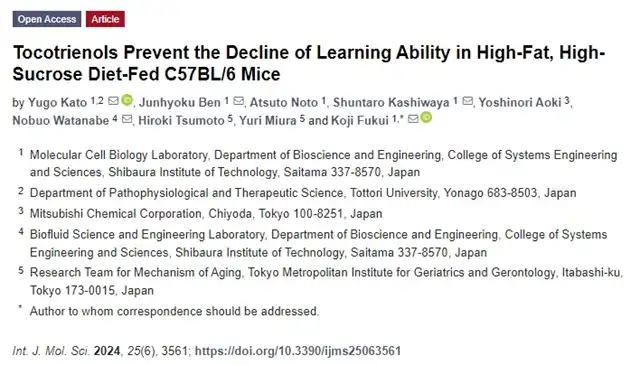This common vitamin benefits the brain and prevents cognitive decline
- Normal Liver Cells Found to Promote Cancer Metastasis to the Liver
- Nearly 80% Complete Remission: Breakthrough in ADC Anti-Tumor Treatment
- Vaccination Against Common Diseases May Prevent Dementia!
- New Alzheimer’s Disease (AD) Diagnosis and Staging Criteria
- Breakthrough in Alzheimer’s Disease: New Nasal Spray Halts Cognitive Decline by Targeting Toxic Protein
- Can the Tap Water at the Paris Olympics be Drunk Directly?
This common vitamin benefits the brain and prevents cognitive decline
- Should China be held legally responsible for the US’s $18 trillion COVID losses?
- CT Radiation Exposure Linked to Blood Cancer in Children and Adolescents
- FDA has mandated a top-level black box warning for all marketed CAR-T therapies
- Can people with high blood pressure eat peanuts?
- What is the difference between dopamine and dobutamine?
- How long can the patient live after heart stent surgery?
This common vitamin benefits the brain and prevents cognitive decline
Dementia is a global health issue with high economic and social burdens. There are approximately 50 million dementia cases worldwide, with around 10 million new cases annually.
Despite the considerable efforts in the scientific community, there is still no highly effective treatment to prevent or cure Alzheimer’s disease.
Obesity is both a characteristic and a disease and is one of the causes of cognitive decline.
Tocotrienols (T3), a member of the vitamin E family, are a group of naturally occurring compounds. Early studies have shown that T3 has anti-obesity and neuroprotective functions. Moreover, they have been shown to cross the blood-brain barrier and enter cells to produce antioxidant effects. However, the mechanism of action of T3 in obesity-induced cognitive decline is not yet clear.
Recently, researchers from Shibaura Institute of Technology in Japan published a research paper titled “Tocotrienols Prevent the Decline of Learning Ability in High-Fat, High-Sucrose Diet-Fed C57BL/6 Mice” in the International Journal of Molecular Sciences.
The study showed that Tocotrienols (a form of vitamin E) can alleviate brain oxidative stress in obese mice, thereby protecting the brain from obesity-related cognitive decline. This provides a new approach to developing treatments for neurodegenerative diseases related to obesity.

In this study, researchers subjected mouse models to a high-fat, high-sucrose diet (HFSD) or a standard control diet, with or without T3 supplementation. They conducted maze tests to assess cognition and measured key parameters such as body weight, fat deposition, serum cholesterol, triglycerides, and analyzed markers of oxidative stress and protein changes in the cortex to explore the effects of T3 on cognitive ability in obese mice.
In all four groups of mice, body weight gradually increased, with the HFSD-fed group higher than the control group, and no difference between the HFSD-fed group and the HFSD+T3-fed group. This suggests that HFSD feeding leads to obesity in mice, but T3 supplementation does not reduce weight gain.
Maze test analysis found that compared to the control group, the learning ability of mice fed the HFSD significantly decreased, while mice fed the HFSD+T3 significantly improved their learning ability.
Measurement of brain oxidative levels by protein imprinting showed that HFSD feeding accelerated protein oxidation, with no significant difference between the control+T3 group and the HFSD+T3 group, indicating that HFSD feeding increases oxidative stress in mice, and T3 helps alleviate brain oxidative stress in mice. This suggests a potential mechanism for its neuroprotective effect.
The research team also found that HFSD reduces the metabolism of mice and increases the temperature around brown adipose tissue, indicating that HFSD may have complex effects on metabolism and temperature regulation in the body.
Finally, the researchers analyzed the changes in cortical protein composition in mice, focusing on the expression of different proteins between the HFSD group and the control group. Compared with the control group, obesity induced by HFSD altered 12 proteins, but mice receiving T3 significantly prevented these changes.
The researchers stated that the global obesity rate has been increasing, and our goal is to use natural compounds to combat diseases related to obesity, thereby reducing the incidence of diseases such as dementia in individuals affected by obesity.
In conclusion, the results suggest that obesity induced by HFSD leads to cognitive decline by enhancing brain oxidative stress, and T3 may exert antioxidant effects, protect the brain, and prevent cognitive decline. The study reveals some of the relationships between obesity and cognitive decline, opening up new avenues for developing treatments to prevent neurodegenerative diseases related to obesity.
This common vitamin benefits the brain and prevents cognitive decline
(source:internet, reference only)
Disclaimer of medicaltrend.org
Important Note: The information provided is for informational purposes only and should not be considered as medical advice.



